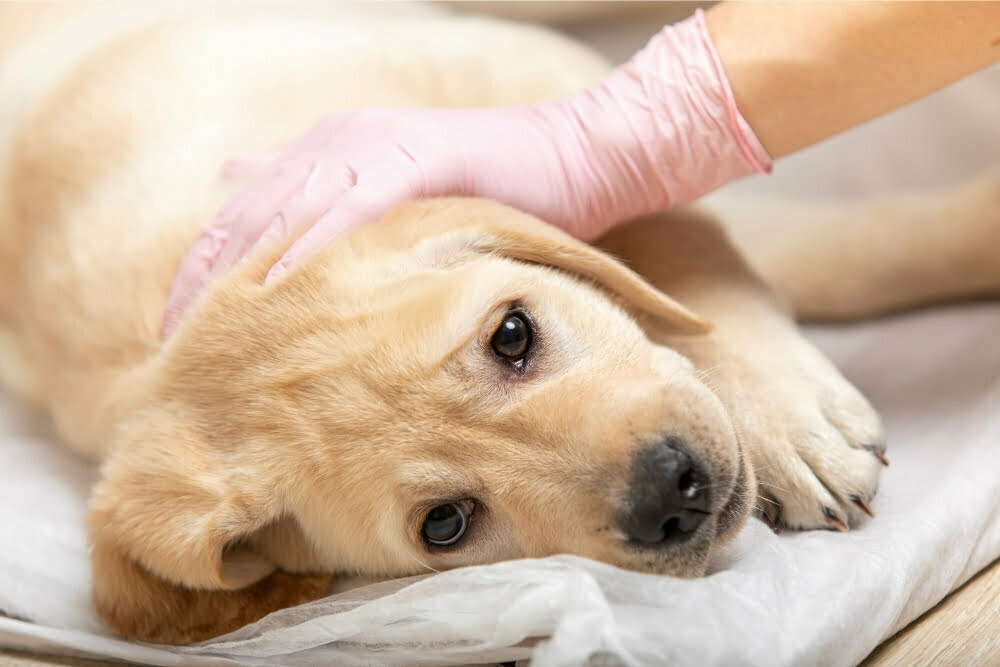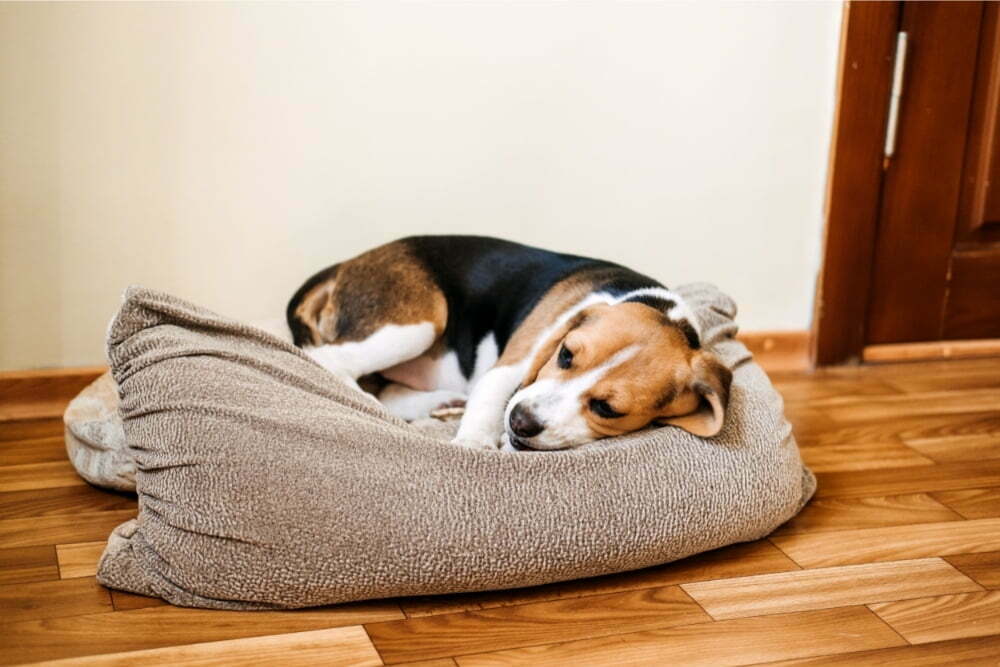
In the first few weeks of their lives, puppies will undergo a few sets of injections. These injections help to protect them against highly contagious canine parvovirus.
That being said, it is not 100% reliable, however, having shots at 6 weeks old, followed by another at 8 weeks, and another at 12 weeks will protect your puppy from getting parvo.
If your pup has not been vaccinated against parvo, and it has come into contact with other dogs, there is a chance that they could contract parvo.
If this has happened then it is key to know the survival rates from him, and how you can treat the puppy.
First of all you will want to know how you can tell if your puppy will survive parvo. The best indicator that your pup will survive this is when vomiting stops, they become more active, and you no longer find blood in their feces.
This is meant provided that your puppy has been properly diagnosed by a veterinarian, and is going through parvo treatment.
The odds of survival in dogs with Parvo
Parvo is a fairly deadly disease for dogs. If a puppy contracted parvo, they can die within 48 to 72 hours, so the key to survival is immediate diagnosis and treatment for parvo.
One of the best signs that your puppy is on the road to recovery is that their fecal matter hardens and there is no blood in it anymore.
Chance for survival is good. Although parvo can be a fairly deadly disease in dogs, the survival rate in puppies that are given professional treatment by a licensed veterinarian ranges between 68% to 92%, which are some really good numbers.
If your puppy has survived the first 4 days of parvo, then there is a high chance that they will completely recover.
Your pup should stop vomiting and will then start eating normally once more. You should also notice that they are less lethargic, and they will likely return to their active and playful self.
During the first 12 weeks of their lives, you need to keep a super close eye on them and make sure that they steer clear of any unvaccinated dogs. If your puppy does get parvo, then you will need to get them to the vet pronto to start treatment.
Getting a diagnosis of parvo can be absolutely devastating, however if you catch it in time you can treat it and save your pup.
Although we know you don’t want to hear it, we also want to discuss the chances of them surviving, and how to know if your pup is not going to make it.
We will also tell you how you can treat them, and how much it will likely cost to treat your pup for parvo.
Your puppy will be at risk from parvo until all three shots have been administered to them over the course of 12 weeks. A booster shot is then needed once a year to keep your dog protected from contracting parvo.
You will need to be extra cautious during the first 12 weeks/ 3 months of your puppy’s life. You should also never buy a puppy without then having their first set of shots as well.
If your puppy does contract the disease, there are a few ‘near-death’ signs that will alert you.
- Abdominal bloating and pains.
- A fever, or hypothermia.
- Persistent vomiting with blood in it.
- Frequent and blood diarrhea.
- No appetite, as well as a refusal to eat.
- Lethargy. This includes your puppy not walking or moving around.
It can take up to 10 or 14 days before your puppy will start showing these symptoms after they have been exposed to the virus.
Ways to tell if your pup is dying from Parvo
Parvo moves very quickly and if it is not treated very quickly your pup could die within 48 to 72 hours.
If you do not get the right treatment then the likelihood of survival is 9% If left untreated, it is possible that your pup can die from dehydration.
Aside from the signs we have mentioned in the above section worsening, the degrading pup will start to become lifeless, depressed and very cold.
Parvo causes internal bleeding, so you will see their feces turn into increasingly liquid, bloody diarrhea. There will also likely be blood in their vomit and their gums will turn very pale.
If your pup is receiving treatment and is receiving hydration, then the pup is still prone to getting sepsis. If this should happen then the pups organs will start to fail. The pup will display similar signs of death when they are untreated and dehydrated.
If you do manage to get your puppy started on treatment early enough, then the pup will have a much higher survival rate, at 68% to 92%.
Proper treatment should be done by your veterinarian, they will then advise you on how the treatment plan will be implemented.
A treatment plan from a vet will usually include three main things.
- Supportive treatment of diarrhea, vomiting, and dehydration by ensuring that these symptoms are managed and brought under control.
- Ensuring an adequate nutrient intake for your puppy via a drip- food is unlikely to be an option at this point, a drip will replace this until they can eat again.
- A course of antibiotics to treat any secondary bacterial infections that can occur as a result of the virus damaging the puppy’s intestinal walls.
Your veterinarian should also advise you on what steps you should take if you have other dogs at home as well so that you can prevent the parvovirus from spreading.

How long does Parvo usually last?
If your puppy survives the first four days of parvo then their chances of recovery are much higher.
It will normally take up to seven days for puppies to completely recover from parvo, however this will depend on the level of treatment that they have received.
There is no way humanly possible to emphasize enough how important it is to get treatment for a puppy as soon as possible. The right treatment will also mean that your pup will recover in a much shorter timeframe as well.
Due to the continuing development of your puppy’s immune system, they are more likely to take longer to recover from something like parvo, even with top-of-the-line treatment.
If treatment is started early, and your pup is being treated at the vet’s hospital then their chance of recovery is 90%, as long as they also survive the first 4 days of parvovirus.
If you opt for home treatment then the chances of recovery are 85%, however this is only if you are super vigilant, and you follow the vet’s instructions with absolute precision.
What does it cost to treat Parvo?
Canine parvovirus is a very expensive disease to treat, this is why you must be so careful in the first 12 weeks of your puppy’s life, not only for their health and life, but also for the sanity and security of your wallet.
You could expect to pay anything between $500 and $2,500 to help your puppy recover from this infection. If your pup needed to be hospitalized for an even longer period then this cost will continue to go up.
For many pet owners, these kinds of costs are way beyond their budget for care, and they often end up having the pup euthanized.
This can be a horrific decision to make for so many dog lovers, and so it is always absolutely essential that you ensure your pup is correctly vaccinated for parvo.
One question we are sure you are asking is, ‘why does it cost so much to treat parvo?’ Well, first of all the tests to diagnose parvo end up costing a few hundred dollars themselves.
Once the disease is confirmed then a treatment plan must be put into place. This treatment plan will often include hospitalization, medications, intravenous drips, and many other procedures if considered necessary.
If your pup does not respond well to the treatment plan that is in place, then it is possible that your vet may decide to do a blood plasma transfusion.
This is a procedure only usually done in the most severe cases and can cost up to $1,000 per day alone.
Due to these high costs, a vast number of pet owners will opt to do home treatment plans instead. Thus avoiding the costs of in-hospital treatment. While it does bring down the costs of treating parvo, it does put your puppy’s life directly in your hands.
Can you treat your puppy at home?
Once your puppy has been diagnosed with parvo by your vet, you can decide to treat them at home.
Your vet will give you the best advice they can for performing home treatment. The primary focus on this will be to prevent your puppy from becoming dehydrated.
Let’s look at a few of the most important home treatments for parvo in puppies.
1. Hydration.
Keeping your puppy hydrated includes giving them small and regular doses of water with electrolytes. This will be challenging for your puppy as they will find it hard to keep liquids in as they will be continually vomiting and suffering with diarrhea.
2. Check your pup’s hydration levels.
To check the levels of hydration in your puppy you can pinch your puppies skin up gently and letting it go. If the skin snaps back immediately then the hydration levels in your pup are healthy.
However, if the skin flap takes a while to settle back into place then you need to get some hydration into your pup as soon as you possibly can.
3. Keep an eye on their gums.
A healthy gum in any dog is pink. If your puppy’s gums begin to turn gray, white, or even a bright red, then you need to grab your puppy and zoom off to the vets instantly.
4. Nutrients.
Your puppy will be feeling very nauseated, and they will refuse food.
However, if you can get small quantities of canned, or even bottled baby food, that is plain with no onions or garlic in it, and get it into your pup then it will increase their chances of survival.
If you mix little bits of this food in with their water and use a dropper you can get some food into your pup.
Get inventive, and you can help them to get the nutrition they need. You will also likely be informed of a prescription diet by your vet to assist in their recovery.
5. Alternative medications.
You can also try homeopathic medicines to help in alleviating some of the symptoms of parvo while you manage your pup’s condition.
Overall
Parvo is a very serious virus that is highly contagious. It requires immediate interference through diagnosis and treatment.
Once diagnosed your puppy will receive ongoing treatment until they recover. You can opt for home treatment if you simply cannot afford the veterinary bills, just be aware that this puts your puppy’s life entirely in your hands.
If you do opt for home treatment then you need to ensure that you contact the vet if you have any concerns during the course of the treatment.
Knowing if your puppy will survive parvo is something that every owner will want to know. Your vet knows what they are doing. Trust their judgement and follow their lead and your puppy should pull through.
